Peter MALONE
Hijo, El/ The Son
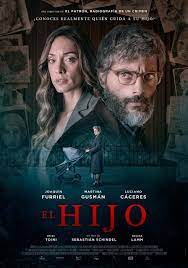
EL HIJO/ THE SON
Argentina, 2019, 92 minutes, Colour.
Joaquin Furriel, Martina Gusman, Luciano Caceras, Heidi Toini, Regina Lamm.
Directed by Sebastian Schindel.
Argentinian Director, Sebastien Schindler, has made a number of intriguing films focusing on intense personal relationships as well as crime, The Boss, The Wrath of God.
This film has intrigued many audiences but also frustrated many, as can be seen in denunciations in the IMDb. And this, especially, concerns the ending. However, as with his other films, there are enough clues in the screenplay for audiences to make up their own minds as to what has happened in the plot and, especially, with the ending.
At the centre of the film is a Bohemian artist, separated from his wife, no contact with his daughter’s, drinking in the past, something of a celebrity with his art. In middle age, he has married a Norwegian scientist involved in experiments in Argentina (illustrated by the elaborate credits sequence). She becomes pregnant, invites the midwife who helped in her own birth to come and live, speaking Norwegian, edging out Lorenzo, the artist.
As with shingles other films, the narrative moves from the present to the past, often without warning. The narrative then fills out the artist’s background, as well is fast forwarding to his being put in jail, gradual information that a son has been born (then the visuals of that episode, alienation from his wife because of her restrictive control over his son, the influence of the Norwegian midwife, the divorce, his violent reactions. He is helped by a close friend from the past and her husband, sympathetic, helping with legal matters, his asking them to be godparents to his son.
There is quite some tension in the audience identifying with Lorenzo but frustrated by his range of moods and behaviour, discussions about custody of the child, Lorenzo into being with tragic consequences.
The mystery for audiences is in the sequence, two years later, the godparents with the little boy, the return of the wife and midwife to Argentina and the issue of how many sons there were, who is the real son…
- The title? Pregnancy and birth? Obsessive parenting? Parents unable to have children?
- The Argentinian setting, the home of the artist, studio, the contrast with apartments, comfortable homes? Outings, the streets, art galleries? The musical score?
- Lorenzo, his story, age, artist, Bohemian, giving up drinking, separation from his first wife, not contacting his daughters, marrying Sigrid, his devotion to her, her pregnancy, exceeding to her whims, at home, food, at the Gallery, her wanting to leave?
- The arrival of the Norwegian midwife, helping with Sigrid’s birth, dominating the house, their talking in Norwegian, excluding Lorenzo? Sigrid giving birth, Lorenzo outside the door, her screams? Lorenzo going in, Sigrid tranquil with the son? Lorenzo and his devotion?
- The screenplay fast forwarding, Lorenzo’s arrest, the audience wondering, in prison, the treatment? Julieta, the relationship from the past, her loyalty to him, coming to the police station, acting as his lawyer? His behaviour in prison, the diagnosis of his psychological problem, assuming that there had been substitution of persons? His being allowed out, the apartment, painting?
- The buildup to Lorenzo’s behaviour after the birth, his being excluded, the child and mother in the dark, the Norwegian midwife as the barrier, his being allowed to see the child, his concern about the health, taking the child to the hospital? Return, the police, the accusation, the physical clash with Sigrid, his past reputation against him?
- Lorenzo staying with Julieta and Renato for three months, their help? Sigrid and the hearing, wanting to take the child to Scandinavia, Julieta and her opinions, Lorenzo wanting to seize the boy, giving his consent? The outing with Julieta and Renato, Julieta unable to have a child, thinking of adoption? Lorenzo leaving the house, Julieta and Renato going to his apartment, seeing all the sketches of the boy, going back to the house, discovering Lorenzo dead?
- Lorenzo in the house, the midwife, Sigrid and the rifle, his seeing the bags packed for Scandinavia? His death? His arranging for Renato and Juliet are to be godparents? The police giving them custody?
- Two years later, happy with the boy, the sighting of the midwife, tracking her to the forest house, the clothes line, the children’s clothes?
- The ambiguity for the audience, did Sigrid have twins, keeping one and letting Lorenzo see the other, giving him the other, taking one to Scandinavia, the return? The possibility of Sigrid abducting another child and giving it to Lorenzo? The variety of possibilities?
Halftime
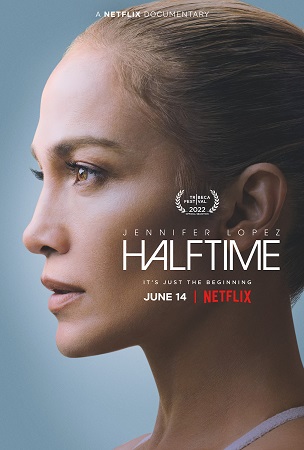
HALFTIME
US, 2022, 96 minutes, Colour.
Directed by Amanda Micheli.
This is definitely a documentary for fans of Jennifer Lopez, who have been following her for decades, as a dancer, singer, actor, celebrity.
However, the title indicates that in 2019, Jennifer Lopez turned 50. And the literal halftime is that of the performance at the Super Bowl in Miami, 2020, and Jennifer Lopez performing as well as making political statement.
There are quite a number of interviews with Jennifer Lopez talking to camera, reminiscing about her past, clash with her mother and walking out, the dancing jobs, her eventually being cast as Selena and making an impression with that film, Golden Globe. There are visual suggestions of some of our other films and actor she worked with including George Clooney, Ralph Fiennes, Owen Wilson…
The film also focuses on her singing career, the many awards, her albums. And there is her dancing and the particular style. Fashion is important and for those who enjoy the visuals of a range of costumes for celebrities, there is an abundance!
The chronology moves about, focusing on 2019 and the months of development of the Halftime performance in Miami, as well is going back to various episodes of the past. There is also an emphasis on the release of the film Hustlers, if the claim, praise for her performance and some Festival awards, the preparation for going to the Golden Globes, expectations of an Oscar nomination – and her disappointment with not winning or being nominated and the reaction of her fans and co-workers many of whom had been with her for 20 years.
There are several scenes with her daughter, rather than with her son, her daughter taking a mother to a dance school and the children being incorporated into Halftime, and her daughter with a central performance.
The film does not spend any time much on Jennifer Lopez and relationships except for some comments from Ben Affleck.
One of the main features that emerges from this documentary is that Jennifer Lopez has felt very hurt over the decades, especially about comments on her figure, the literal butt of jokes and satire, her being cheery but nevertheless hurt. She lets this vulnerability be seen.
On the other hand, as might be expected, she has strong ego and drive, especially in the discussions with the authorities for the Super Bowl, the discussions with costumes, choreographers, dancing cast.
This reviewer had a difficulty with her constant chewing gum throughout the film, very American, but too much!
The film is released on Netflix on June 14, 2022. Comments on the IMDb on that day illustrate the different attitudes towards Jennifer Lopez, mainly praise for this documentary but several, rather like patrol comments, not only putting her down but reprimanding her, exhorting her to learn humility… However, Jennifer Lopez in scenes after the Halftime performance, illustrate her patronage of social courses and her financial support.
Perfect Wedding, The
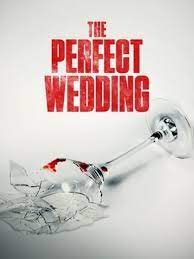
THE PERFECT WEDDING
Canada, 2021, 90 mzinutes, Colour.
Tenika Davis, Lydia Zader, Eric Hicks, Julia Borsellino, Barbara Gordon, Drew Moss, Erica Anderson, Deklon Roberts.
Directed by Roxanne Boisvert.
The Perfect Wedding? Not!
This is a Canadian melodrama, full of plot tangles, which serves as popular entertainment for 90 minutes. Will the leading lady be vindicated? Will the villain be exposed? And what happens along the way?
This is a story of an engaged couple, each celebrating their bachelor and bachelorette party, but the bachelorette party sabotaged by the seeming friend. Lindsay, the fiancee, is drugged, carried up to a hotel room, set up with the hired male escort, photographed, an mischief made with the photos and innuendo.
The villain is Catherine, working for Brandon, the fiance, and obsessed with him, always it is Beck and call, putting herself out to help him, becoming indispensable.
The action of the film shows Lindsey and her friend Dayna starting to follow the clues, going back to the bar, trying to get information, finding Catherine’s brother, Billy, he gives them information about the male escort, more information because he is terrified of his sister.
Meanwhile, Catherine is busy insinuating herself to her boss’s mother, spreading more falls information about Lindsay.
Ultimately, Lindsay tracks down information about Catherine’s past, which indicates that she has killed in the past. But, Brandon still seems to be dependent on Catherine.
However, she is eventually arrested…
The perfect 90 minute television melodrama.
Getaway King: Najmro, The
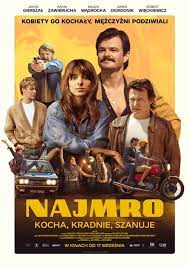
THE GETAWAY KING/ Najmro: Kocha, kradnie, szanuje
Poland, 2021, 100 minutes, Colour.
Dawid Ogrodnik, Robert Wiekiewicz.
Directed by Mateusz Rakowicz.
This is a lively Polish adventure based on a character in real life, and escape artist, Najmro. He is played with engaging flair and cheekiness by Dawid Ogrodnik. He was something of a sensational figure in Warsaw and in Poland in the latter part of the 1980s, the time of the decline of the Soviet Empire and its influence.
Najmro is a thief, skilled at his work, but operating with a team of loyal followers. The focus is on robbing the well-stopped superior stores in Poland and distributing the stolen goods, or selling them at an advantage, to those in need. Later their exploits extend to the stealing and marketing of upmarket cars.
There is also a police officer, charged with tracking him down, his assistant not the brightest. There are several arrests, and there are several escapes, and the nickname of the Getaway King. However, there is a breakdown in relationships with his team, one of his collaborators, former friends, putting him into the police.
However, he was pardoned in 1994.
An entertaining light drama in the Robin Hood vein.
- The title, the original title focusing on Najmro himself. And escape artist?
- Based on a true story and character, the 1980s, Poland and Warsaw during the communist era? Difficulties, scarcity of goods, the luxury shops? Ordinary people? And daredevil hero, enjoying himself, the robberies, food and goods, luxury cars and reselling them, the relationship with his team? Falling in love? Arrested, 29 escapes? Something of a folk hero?
- The situation, the visualising of the thefts, the team, personalities, backgrounds, meetings, watches and coordinating, in the stores, the methods of stealing? Redistribution of the goods, and making money? The plan with the luxury cars, the methods, the new customers?
- The police, Barski and his determination, his character, following the team, his plans, his assistant – and his limitations? The arrests, the escapes, the continued pursuits?
- Public response, the news, articles, the Robin Hood effect?
- Najmro and his age, experience, carefree, the robberies and his motivations, with his team, falling in love, clashing with his associate, the associate and his anger, going to the police, betrayal?
- The change in Poland during the 1980s, into the 1990s, the getaway King’s reputation? Pardoned in 1994?
Manifesto

MANIFESTO
Germany, 2015, 95 minutes, Colour.
Cate Blanchett, Erica Bauer, Ruby Bustamante.
Directed by Julian Rosefeldt.
A challenging cinema experience for any audience. For devotees of arthouse cinema, there is much to interest and admire. For many audiences, Manifesto would be better appreciated with some background information.
With appreciation for the work done for this Wikipedia entry:
The film integrates various types of artist manifestos from different time periods with contemporary scenarios. Manifestos are depicted by 13 different characters, among them a school teacher, factory worker, choreographer, punk, newsreader, scientist, puppeteer, widow, and homeless man.
The film consists of 13 segments, each 10:30 minutes long. In each, a character recites parts of manifestos of various political and artistic movements.
|
No. |
Character |
Manifestos |
|
1. Prologue |
Burning fuse |
Karl Marx / Friedrich Engels, Manifesto of the Communist Party (1848) |
|
2. Situationism |
Homeless man |
Lucio Fontana, White Manifesto (1946) |
|
3. Futurism |
Broker |
Filippo Tommaso Marinetti, The Foundation and Manifesto of Futurism (1909) |
|
4. Stridentism / Creationism |
Tattooed punk |
Manuel Maples Arce, A Strident Prescription (1921) |
|
CEO at a private party |
Wassily Kandinsky / Franz Marc, "Preface to the Blue Rider Almanac" (1912) |
|
|
6. Dadaism |
Funeral speaker |
Tristan Tzara, Dada Manifesto 1918 (1918) |
|
7. Fluxus / Merz / Performance |
Choreographer |
Yvonne Rainer, No Manifesto (1965) |
|
8. Surrealism / Spatialism |
Puppeteer |
André Breton, Manifesto of Surrealism (1924) |
|
9. Architecture |
Worker in a garbage incineration plant |
Bruno Taut, Down with Seriousism! (1920) |
|
10. Suprematism / Constructivism |
Scientist |
Naum Gabo / Antoine Pevsner, The Realistic Manifesto (1920) |
|
11. Pop Art |
Conservative mother with family |
Claes Oldenburg, I am for an Art... (1961) |
|
12. Conceptual Art / Minimalism |
Newsreader and reporter |
Sol LeWitt, Paragraphs on Conceptual Art (1967) |
|
13. Film / Epilogue |
Teacher |
Stan Brakhage, Metaphors on Vision (1963) |
Production
Development
Rosefeldt began developing the project through research and analyses of an assortment of textual manifestos, starting from Karl Marx and Friedrich Engels' 1848 The Communist Manifesto and Filippo Tommaso Marinetti's 1909 The Founding and Manifesto of Futurism, the latter his first selection, to film director Jim Jarmusch's "Golden Rules of Filmmaking" (2004), the most modern text referenced.[6] Rosefeldt selected approximately 60 manifestos which he "found to be the most fascinating, and also the most requitable", or chose "because they suited one another."[6] After collating and fragmenting numerous texts, eventually 12 manifesto collages materialized.[6]
Rosefeldt said that the main concept for the project was to have a woman embody the manifestos.[6] He wanted to "make a piece in which a woman performed multiple roles" in an art-based framework.[7]
In parallel, I began to sketch different scenes in which a woman talks, ending up with sixty short scenes, situations right across various educational levels and professional milieus. The only thing these draft scenes had in common was that they are being performed today, and that a woman is holding a monologue ... Sometimes we listen to the woman's inner voice; in other instances she addresses an audience; once she even interviews herself, etc. I finally edited everything down to twelve scenes and twelve corresponding text collages.[6]
Woodlawn
WOODLAWN
US, 2015, 123 minutes, Colour.
Sean Astin, Nic Bishop, Caleb Castille, Jon Voight, Lance E.Nichols, Sherri Shepherd, Joy Brunson, C.Thomas Howell, Kevin Sizemore, DeVon Franklin.
Directed by Andrew Erwin, John Erwin.
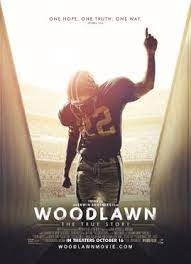 Woodlawn is the name of the college in Alabama in the 1960s and 70s.
Woodlawn is the name of the college in Alabama in the 1960s and 70s.
The opening of the film, the opening credits, highlight themes of segregation at the time, the role of Martin Luther King, the role of the governor, George Wallace, the prejudices of the times, the harsh consequences of segregation. By 1970, when this film opens, there are moves towards integration.
However, this is also a religious film, strongly so, explicitly so. And it is the work of the Irwin brothers who during the 2010 is, built up quite a reputation, along with the also-productive Kendrick brothers, in providing faith films for the American audience, films which did very well at the box office. The Irwin’s were not always so explicitly religious, “focusing on more “secular” themes and leaving it to the audience for their faith response. However, this is a film about the Jesus Revolution of the time, taking its cue from a Time Magazine cover. There is an emphasis on religious music, I Still Believe, I Can Only Imagine.
The focus of this film is on American football, as played out Woodlawn College, a focus on the coach, who begins with a touch of racism and intolerance but who experiences of religious conversion, being baptised, supporting his team. There are the school authorities and the local education authorities who react badly about religious behaviour, especially prayer before games, of open rallies before games, separation between church and state.
But there is also a focus on a champion footballer, Tony Nathan (Caleb Castille), African-American, sympathetic family, friends at school, but experiencing racism, coming through the crises and leading the Woodlawn team to victories (unexpected victories). In fact, Tony Nathan is an actual character in the final credits give information about him as well is various other members of the cast and their careers, especially in football.
The Irwin brothers have the ability to invite name actors to participate in their films, in this case Jon Voight and C.Thomas Howell as well is Sean Astin as a committed preacher who influences the team and the coach.
- A faith-based film? Explicit? Based on the 1970s came Jesus Revolution?
- The work of the directors, their faith background, Alabama, race issues, integration, sports issues, there sports filming background, music videos?
- True story, the 1970s, the significance of the credits, black-and-white photos and clips, race relationships, antagonism, segregation, killings, Martin Luther King? George Wallace and segregation forever? The setting for the transition, 1970-1980?
- Audience response to faith-based films? Believers and their enthusiasm? Non-religious and their scepticism? Accusations of preaching and manipulation?
- The football focus, audience response to the game, the highlights of the particular games of the 1970s? Practice?
- Tony Nathan, age, experience, school, segregation, memories of discrimination? The bond with his parents? The younger brother? The episode of the brick through the window? At the church, the preacher, enthusiasm? At school, his friends, football practice, the games? His career, the award and his refusing to be photographed with the racist? His girlfriend, shyness, the bus, bonding, her turning him away, her father? His standing up to her father? Her support?
- The administration of the school, separation of church and state, no explicit religious prayers and ceremonies? The meetings with the coach, his initial scepticism, the chairman of the board, all in the coach over the calls, threatening him?
- Hank, preacher, his story, work, accident, injury, his cane? Religious background, enthusiasm? Speaking to the members of the team, his speech, their raising their hands, joining him, prayer? Prayer is part of the preparation of the game? The significance of the huge rally before the game? The rally and the lighting the candles? (And the influence of Billy Graham and his rallies, seen at the beginning, the long focus on Billy Graham at the end, faith, Jesus, peace, transforming the world?)
- The coach, with his family, secular, brought up with racist attitudes? With the team, love for coaching? Puzzled by Hank? Interactions with the team, the various games, training, morale boosting? His change of heart, and experience conversion, the men and their prayer, going to the church, his speech, his being baptised? His son going along to help him with the coaching?
- The coach, Bear Bryant, the beginning of the film, his observations? Later return, the visit to the Nathan household, discussions, encouragement of Tony? Scouting him for his later career?
- The other members of the team, skills, working together, prayer, morale?
- Shorty, the southern type, raucous, racist, coaching, his player and the award? Loud, interactions with the coach? The plan for the two teams training together, the summer camp, the effect, change with Shorty?
- The years of matches, the scenes of the matches, the commentators, Woodlawn improving? The authorities and antagonism?
- Years later, Tony Nathan and his success, the phone call to the coach, the coach selling insurance, encouraged by Tony, putting his baseball cap on again?
- The final credits and the information about each of the central characters, their careers, success? In the 1970s and the Jesus Revolution?
Hustle/ 2022
HUSTLE
US, 2022, 117 minutes, Colour.
Adam Sandler, Queen Latifah, Juancho Hernangomez, Ben Foster, Kenny Smith, Robert Duvall, Jordan Hull, Maria Botto, Heidi Gardner.
Directed by Jeremiah Zagar.
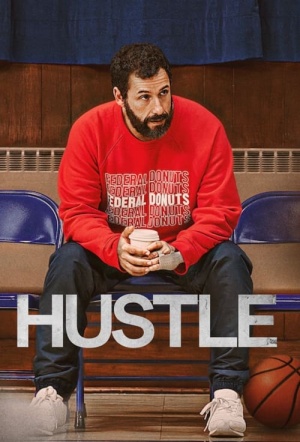 With Adam Sandler’s name topping the cast, there will be fans very keen to see his latest film, especially with the emphasis on sport and basketball. But, there will also be a number of non-fans who will reject the opportunity to watch Hustle because of the presence of Adam Sandler. As it turns out, that would be a mistake on their part.
With Adam Sandler’s name topping the cast, there will be fans very keen to see his latest film, especially with the emphasis on sport and basketball. But, there will also be a number of non-fans who will reject the opportunity to watch Hustle because of the presence of Adam Sandler. As it turns out, that would be a mistake on their part.
While Sandler has built up a strong reputation over many decades for broad comedy, and a great deal of clowning, he has also had some more serious roles, roles which drew admiration from critics and audiences, films like Punch Drunk Love, The Meyerowitz Stories, Uncut Gems. (And then he makes Who be Halloween just before hustle!)
Sandler subjugate himself to the role and the character of the sports coach for the Philadelphia 76ers this means much of his time travelling internationally as a scout, will it all kinds of matches, characters, generally in Europe, by and large rejecting them as candidates. His preference would be to stay at home with his family (where we surprisingly find Queen Latifah as his wife, quiet and engaging). He does have the backing of the owner of the 76ers, played by 91-year-old Robert Duvall (60 years after he was be Radley in To Kill a Mockingbird). However, his ambitious son, played by Ben foster, is not so sympathetic, sending Sandler out for further Scouting expeditions.
On one of the expeditions, Toma Lorca, the candidate not being suitable, Sandler wanders around and finds a local match in a neighbourhood, a tall player been most impressive. Sandler follows him, in the bus, rejected, to his home, meeting his mother and daughter, learning more about him, eventually offering him the possibility for being part of the 76ers. His played, with a blend of arrogance and the genial, I basketball player, the very tall Juancho Hernangomez.
For basketball fans, this will be a must, full of interestingly photographed and edited games, training, ploys.
In a way, the rest of the plot is predictable, but enjoyably so, the testing of the new recruit and his almost sabotaging possibilities for a career by his inability to keep calm during taunts in play, the coach offering his resignation, going it alone, lots of scenes of coaching (and, because this is Philadelphia, a lot of running up hills and steps à la Rocky, and eventually an actual reference to Rocky), new opportunities for all.
While it certainly is Adam Sandler there in the central role, it is not the full-on Adam Sandler of the comedy is, which means that he plays an engaging character, interesting developments, and reminds us of what he can do seriously as well is comically.
- A basketball film? For the fans? Sports fans? The wider audience?
- Philadelphia, the city, the 76ers? The basketball ethos? International sequences, Scouting for players? Sequences in Mallorca? The musical score?
- The importance of the basketball sequences, games in neighbourhoods, professional games, practice, the details of training? Dedication to the sport? Commitment?
- So many professionals in the film?
- Adam Sandler as Stanley Sugarman? A serious role for Sandler? Persuasive? Age, experience, love of basketball, his talent in the past, the accident and his hand, the drinking, blaming himself, the effect on Leon? Their working together? His marriage, devotion to his wife, her patience, love, moments of exasperation? His daughter, encouraging her, studies, film school and filming the basketball practices?
- Stanley, his role with the 76ers, the talent scout, his list, the incessant travel, American fast food on the plane, his rejection of unsuitable candidates? Being sent out by Vince, going to Mallorca, the unreliable candidate, wandering the streets, seeing the game, seeing Boa, following him, hostile response on the bus, to his house, meeting his mother and daughter, the discussions, the offer?
- The 76ers, the owner, his age, presiding at meetings, giving Stanley the office, his uncles, status as coach? News of his death, the wake? The antagonism towards Vince? The support of Kal, especially at the end?
- Boa, height, 22, mother, absent father, love for his daughter? Factory worker? Playing basketball, his skills? Persuaded by Stanley, going to the US, difficulties at customs, the hotel, his extravagance, meals, room service, porno? Going to the game, the antagonism by Kermit? Vince despising him? Failure? To go home, to commit himself?
- Stanley, his belief in Boa, disappointment initially with his game, the confrontation with Vince, his resignation? Support from Leon and other players and contacts? Support from his wife after her exasperation?
- The details scenes of training, echoes of Rocky in Philadelphia, running, up steps, the detailed tactics, the various coaches and players?
- The Combine, the hopes, Stanley urging Boa to take all the attacks, be unemotional? The game, Kermit and his taunts about his daughter and his mother, hitting him?
- Stanley getting his daughter to film the practices, on social media, admiration, number of followers? The challenge to Vince?
- Stanley taking him to the airport, going back to Spain, the news from Leon, Stanley bringing him back, enter into the game, the clashes with Kermit? Exhibiting his skills? Success?
- Recruited by Boston? The game, Stanley still coaching the 76ers? The future?
American Night
AMERICAN NIGHT
Italy, 2021, 123 minutes, Colour.
Jonathan Rhys Meyers, Emile Hirsch, Paz Vega, Jeremy Piven, Fortunato Cerlino, Michael Madsen, Alba Amira, Anastacia, Marco Leonardi.
Directed by Alessio Della Valle.
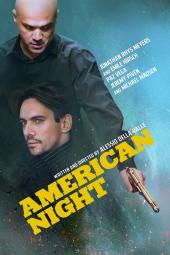 Here is a drama that is definitely intended for cult status. However, is irritated quite a number of critics spurring them to negative reviews. On the other hand, it won over quite a number of fans.
Here is a drama that is definitely intended for cult status. However, is irritated quite a number of critics spurring them to negative reviews. On the other hand, it won over quite a number of fans.
Despite the title, which refers to a club in New York, this is an Italian film. The Dir, Alessio Della Valle, as an artistic background, a music background, with much time spent in the United States as well as travelling internationally. And, one would suspect, that he has a great admiration for the films of Quentin Tarantino (in complex structure, and strange characters and behaviour, in some flashy visuals, music…).
One of the problems, or challenges, is to make sense of the time eras in which the action takes place, especially since it seems to be moving backwards and forwards rapidly. And repeating some sequences, offering further information and background to central characters and conflicts.
There are two principal stories, one focusing on an art dealer played by Jonathan Rhys Meyers, the other on the son of a New York gangster, played by Emile Hirsch. At the centre is a painting by Andy war whole, the Pink Marilyn Munro, in process of deals by the dealer, promise to the young gangster by his father.
Initially we are introduced to a character called Shaky, who is a courier for the art dealers, women, and with connections to Asia which crop up throughout the narrative. He visits a bar, encountering a stuntman, friend of the art dealer, played by Jeremy Pippin. Each has a similar bag – which leads to all kinds of complications, the destiny of the painting and his changing hands.
There is quite a lot of visual violence, especially in connection with the Mafia types. There is also a lot of characters outwitting the other, including, surprisingly, Shaky.
But, all is not well at the end, violence and greed begetting betrayals, violence and greed.
A cult film.
- The title? The club? American night life? An Italian film, an Italian perspective on the US?
- The recreation of New York City? Exteriors, streets, clubs, lights? Mansions and interiors? The art world, galleries? The world of gangsters and the Mafia? The musical score, the title song, Anastasia singing it during the film?
- The screenplay, hints of Tarantino, time shifts, beginnings, ends, middles? Intertwining of John’s story, Michael’s story?
- The focus on the art world, Andy Warhol’s Pink Marilyn? Possession, smuggling, copies, greed? Galleries and finances? Art forgery? International art dealers?
- Michael’s story, as a boy, with his father, the Mafia influence, guns, Michael’s art, his father’s despising it, the role of his mother? Grown-up, seen painting, throwing the paint on the canvas, shooting the bullets? His Gallery of his paintings, the comment on his art? His wilfulness, behaviour towards women, Sarah, the threats, sadistic? The dealers, his thugs?
- John’s story, his art background, his ambitions, working with Sarah, her skills with art and detection, the relationship, with other women, Sarah unmasking him? The Gallery, the finances, the Asian influences and contacts? The art dealers? Confrontations with Michael? The burning of his Gallery? His aim with Pink Marilyn?
- Shakey, the courier, plane trips, keys and deposit boxes, the painting, the travelling bag, the commission by the art dealer? Going to the bar, the encounters, Vincent at the bar, his case, mixed identities? The thugs, the shootings?
- Vincent, friendship with John, the bonds, his work as a stuntman, the scene at the studio, his failure with the stunt? Money, dependents, going to John, the promises? The scene on the wall of the building, using his stunt skills to escape? His bag, the painting?
- Sarah, her skills, the relationship with John, the encounters with Michael? The scorpion story, the attack on her, her being rescued?
- The Asian presence, with John, finances, his dealings with paintings? The Pink Marilyn? The two women, art dealing, commissioning Shakey? The attack in the streets, their deaths?
- The coming together of the two stories, Shakey and his continued presence and links, the bar, the bag, the painting, his meeting with Michael, the violence threat, his escape? The women dealers and their deaths? Sarah being taken by Michael? Michael and his shaving his head, sinister, mad? John, the betrayal of Sara, is rescuing her, the burning of his Gallery?
- John and Michael, violence, art, deaths?
- The film as something of a cult film, many audiences liking, critics very critical?
Informer, The/ 2019
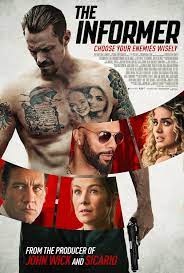
THE INFORMER
US/UK, 2019, 113 minutes, Colour.
Joel Kinnaman, Mateusz Kosciukeiwicz, Rosamund Pike, Ana de Armas, Common, Clive Owen, Martin McCann, Eugene Lipinski.
Directed by Andrea del Stefano.
This is something of a grim crime and police thriller. And it has quite an interesting range of characters and performance, Rosamund Pike and Clive Owen transported to the US and US accents.
However, the central character is played by Joel Kinnaman. His character originally comes from Poland, which eventually entangles him with Polish criminals, drug deals in New York City, drugs being brought in by diplomatic pouches and getting through customs, the setting up of buying opportunities by the kingpin, Polish, in New York. Joel Kinnaman is Piotr, after action in Iraq and its consequences, is a driver for the syndicate.
But, it is revealed, that is working undercover for the FBI, controlled by Rosamund Pike, everything ready for busting the crime lord only for an undercover New York police agent to reveal himself for an arrest and get himself shot. The controller drives away, leavingPiotr to manage, always with the threat to his wife (and the day are mask) and his little daughter. And the threat does become real.
The FBI controller is warned of the case by her boss, Clive Owen. And, one of the officials of the NYPD, played by Common, is investigating the death of his agent and targeting Piotr.
Which means that there are plenty of complications to keep audience interest, tangles to be extricated from, threat to wife and daughter, intervention by the NYPD, clashes with the FBI, and the FBI chief wanting to eliminate Piotr.
Piotr has gone to jail for the drug Lord to be a distributor of drugs within the prison, his wife stuffing a dead pigeon with drugs velodrome dropping them on the roof of the prison… There are sympathetic prisoners, an unsympathetic warden who tries to hangPiotr, Piotr taking the warden as hostage, a siege of the prison, explosions and escape.
There is some clever manipulation at the end in setting up the FBI chief for a fall and for his agent to be free and for Piotr to be reunited with wife and daughter.
- Crime and police thriller? Prison drama? FBI investigation?
- New York City, familiar scenes, the streets, homes? FBI and police officers? The prison sequences, harsh? The musical score?
- The title, Piotr’s story, age, marriage, daughter, devotion to family? Polish background, Polish connections? War service, injury? Court case, jail time? Used as a Polish courier? Used by the FBI as an underground informer? Managed by Wilcox?
- The situation, the Polish network, importation of drugs, the diplomat and his bringing them into the country, the drive, the contacts, the sales, the underground agent revealing himself, his being shot? Wilcox in the setup, hoping to pinpoint the leader? The killing, her backing off? Leaving Piotr stranded?
- His wife, the flowers, with her daughter, her devotion to her husband, knowledge of his life and connections, support?
- Piotr summoned to The General, the discussions, the threats, the proposition that be to go to jail, distribute the drugs within the jail?
- Wilcox, the discussions with Piotr, the discussions with Montgomery? Montgomery in charge, wanting Wilcox off the case?
- Piotr, to go to jail, the scene in the house, smashing the crockery, his wife ringing the police, his arrest, being processed, in jail?
- Piotr in jail, the phone calls to Wilcox, her letting him go? Jail, the types, the connections, violence, the drone and the distribution of the dead bird with the drugs, the contacts within the prison? The corrupt warden, his wanting Piotr hanged? The group hanging him, letting him go?
- Piotr, the plan, taking the guard hostage, going to the tower, Montgomery and the FBI intervention, Wilcox and her observing? The squads coming in, the siege? Piotr and his getting the gas tanks, the explosion, the death of the warden, his survival, being taken out, the ambulance, Wilcox in the ambulance, giving him the gun?
- The complexity of the police situation, Grens, the local New York police, the death of his agent, his suspicions of Piotr, surveillance of the house, confrontation with Montgomery? The contact with Piotr in the prison, the phone calls, his link, the offer of help?
- The threats to the wife and child, the thugs, Grens in the house, his being shot, his being saved by Piotr’s wife shooting?
- Piotr, his escape, Wilcox and her meeting with Montgomery, his urging her to eliminate Piotr, the setup, Montgomery and the arrest, Wilcox and the microphone and the recording?
- Piotr, the family and future?
Frat Star
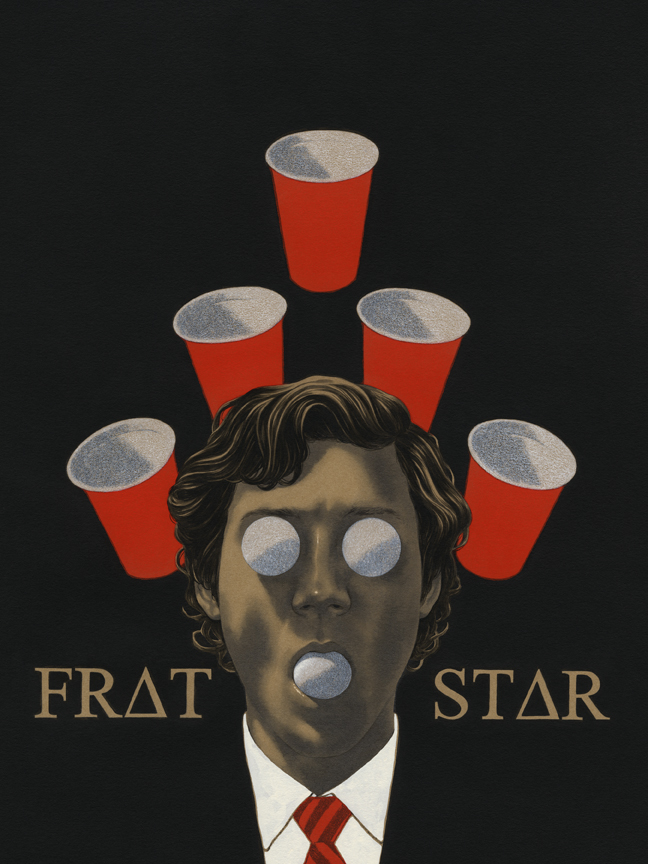
FRAT STAR
US, 2017, 85 minutes, Colour.
Connor Lawrence, Justin Mark, Cathryn Dylan Ortiz, Chris Elliott, Tyler Weaks.
Directed by Grant S. Johnson, Jena Serbu.
A brief film about college fraternities, pledges, hazing…
There is quite a deal of detail of the hazing which means that this film seems to have its cake and eat it at the same time, displaying in detail the bad behaviour and attitudes while doing an expose of them.
The central character is a nerdish young man who gets a scholarship to college, has been in a relationship but is rather timid except in texting his former girlfriend and her new boyfriend. His father is the bluff type, considering himself as one of the boys when at college.
There is a strange phenomenon at the beginning of the film where Nick, the central character, sitting on steps sees a ghostly alternate version of himself appearing. This version will appear during the film as Nick is transformed.
Nick is reluctant at first, especially with his brash roommate, Billy (Justin Mark) who makes every effort to persuade him to join in the initiation. Gradually, Nick’s resistance is overcome and he enters wholeheartedly into the basically stupid and humiliating behaviour demanded by the college aristocratic leaders.
There is also a young woman who is in the sorority and is the target of her becoming a member – which she initially resists but is entangled then with her emotions for Nick.
The ending is fatal for Nick, not resisting the overtures from the elitist leaders but entering more and more wholeheartedly into the experiences – but ultimately rejected.
Roger Moore writes in Movie Nation
Regarding the college sex comedy “Frat Star,” it doesn’t really let co-directors Grant Johnson and Ippsie Jones off the hook by saying “They MEANT” to make something appalling.
They succeeded, exposing the elitist, sexist and degrading “Greek” system as it ruins a perfectly good kid with callousness, sexist humiliations, class snobbery, racist indoctrination and sexual privilege in the most explicit sense.
But it’s a “light” comedy, one that tries to have it both ways, suggesting our hero/victim was already a victim before he got there — that his “initiation” into “manhood” is both necessary and funny. Because Nick Cooper is nothing if not a “pussy,” a financially-aided Ivy League kid who thinks hard work and true love are how one finds success and happiness.
But this grating farce makes its satiric points so clumsily, pounds its punchlines so relentlessly and vulgarly that it only made it to Netflix for the titillation factor. Teenage boys can watch college boys having lots of sex, much of it degrading, with compliant, half-nude coeds.